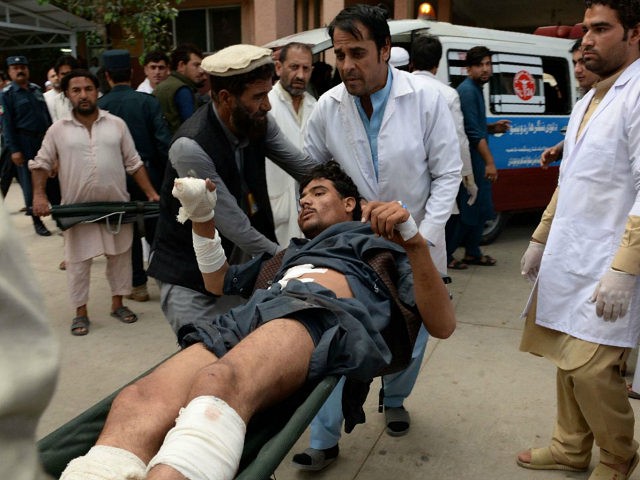Officials in Baghlan, Afghanistan, told the national outlet Tolo News on Tuesday that incessant fighting between government forces and the Taliban jihadist group left over 100 civilian casualties in that district in the past month, most of them deaths and many of them children.
The Taliban escalated its campaign to retake the country in April following President Joe Biden’s announcement he would break the agreement between the United States and the Taliban his predecessor, Donald Trump, brokered that would have seen American forces leave the country by May 1. Trump’s agreement required the Taliban to cease attacks on American forces and cut ties with international terrorist organizations like al-Qaeda in exchange for the U.S. withdrawal. The Biden administration accused the Taliban of breaking the deal prior to changing the withdrawal deadline to align with the 20th anniversary of the September 11, 2001, terrorist attacks that prompted America to attack the Taliban.
The situation in Baghlan mirrors the fighting between the legitimate government in Kabul and the Taliban throughout the country, prompting global concerns that the government will collapse in the immediate aftermath of America’s final withdrawal from the country. President Ashraf Ghani’s administration has insisted that it is confident it will maintain control of the country after American forces leave so long as other forms of American support, which Biden has promised, continue.
The toll on Afghan civilians has nonetheless been staggering, Tolo News reported.
“We had 85 injuries and 21 deaths,” Mohibulah Habib, the head of the Baghlan health department, told Tolo, noting that many were women and children among the civilians. The casualties occurred within the past month.
Afghan officials insisted that the Taliban had suffered significant casualties in the province, as well, stating they could not yet count the Taliban dead on Monday night because “their corpses are still lying behind those walls” that separate Kabul-controlled territory from the Taliban.
In remarks Monday, Afghan military spokesman Ajmal Omar Shinwari claimed that Afghan security forces had killed over 6,000 Taliban jihadists in the past month. The Taliban’s offensive to retake the country district-by-district has nonetheless resulted in the radical Islamic organization now controlling more land than the official government even as Kabul maintains control over a larger percentage of the population. Tolo News reported Monday that the Taliban captured two more districts over the weekend but lost three — after sweeping much of northern Afghanistan last month.
“Dozens of districts have fallen to the Taliban since May 1,” Iran’s pro-regime Tasnim News Agency reported last week, while Afghan media counted the Taliban taking control of 11 districts over the past weekend. Afghan officials expressed particular concern Taliban jihadists may soon conquer land routes into Kabul, isolating the legitimate government.
Abdullah Abdullah, chairman of the High Council for National Reconciliation (HCNR) and a presidential rival to Ghani, warned Wednesday that Afghanistan as a state is facing an existential threat. He blamed the ongoing exit of American and NATO forces from the country in part for the Taliban’s recent success.
“The truth is, today the survival, security and unity of Afghanistan is in danger.” Abdullah told members of the HCNR, according to Tolo News. “With the withdrawal of foreign troops from the country, the war has escalated. Unfortunately, the Taliban side has taken advantage of this, and the foreign troop withdrawal has naturally left a vacuum in some areas.”
Attempts to negotiate peace with the Taliban, Abdullah added, have not yielded “any progress.”
“We want peace from the bottom of the heart … but we are in a situation where we are saying peace and they are (Taliban) nearing the capital of Afghanistan,” he added.
Abdullah made his remarks after meeting with Biden at the White House this weekend alongside Ghani.
“Our troops may be leaving, but support for Afghanistan is not ending,” Biden reportedly told the leaders, according to Afghanistan’s Khaama Press. The statement echoed the remarks by Secretary of State Antony Blinken in April following Biden’s announcement of the extension of the withdrawal, which Blinken made from Kabul.
“The reason I’m here … is to demonstrate literally, by our presence, that we have an enduring and ongoing commitment to Afghanistan,” Blinken said at the time. “Even when our troops come home, our partnership with Afghanistan will continue.”
Khaama listed among the examples of that partnership in its coverage of this weekend’s meeting a promised shipment from the United States to Afghanistan of millions of coronavirus vaccines and reports that Biden had “requested Congress to approve $3.3 billion in security aid for Afghanistan next year.” Much of that aid will reportedly be of a military nature in the form of dozens of Black Hawk helicopters and attack aircraft to help bomb Taliban targets.
Concerns have grown about what will happen to that equipment should Ghani’s administration lose Kabul. Afghan forces have notoriously failed to contain the Taliban’s expansion to such a degree that reports began circulating last week of direct appeals from Kabul to vigilante groups and tribal militias to do the fighting the Afghan security forces should be engaging in. Among those who Kabul is reaching out to are mujihadeen veterans of the war against the Soviet Union in the 1980s and members of ethnic minorities such as the Hazara, who have faced routine Taliban persecution.

COMMENTS
Please let us know if you're having issues with commenting.